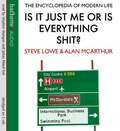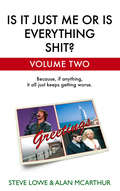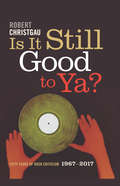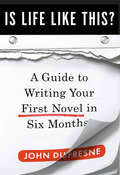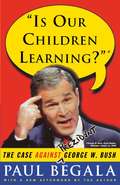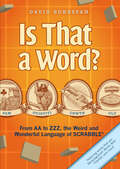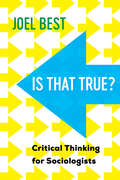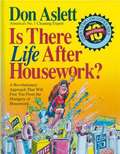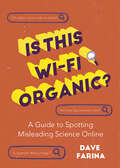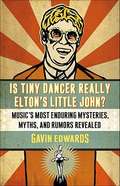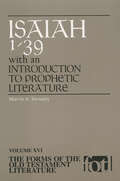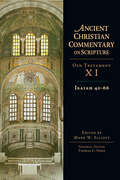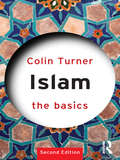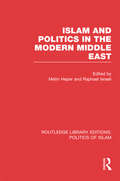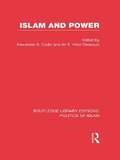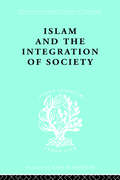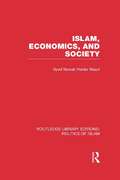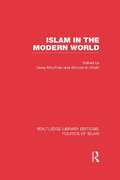- Table View
- List View
Is It Just Me Or Is Everything Shit?: The Encyclopedia of Modern Life
by Steve Lowe Alan McArthurIf you hate: loft living; bar-clubs; Tony Blair; chick lit; global warming sceptics; Keane; loyalty cards; IKEA; Kabbalah; bling and Richard Curtis... ... then you need IS IT JUST ME OR IS EVERYTHING SHIT? - an encylopedic attack on modern culture and the standard reference work for everyone who believes everything is shit. Which it is. This book is for the large percentage of the population interested in saying NO to the phoney ideas, cretinous people, useless products and doublespeak that increasingly dominate our lives. This book is designed for everyone who thinks they may have mislaid their soul in a Coffee Republic. Never before has there been a book so completely full of shit.This very funny, well-informed, belligerent rant of a book adds up to an excoriating broadside against consumer capitalism that the authors hope will sell loads of copies.
Is It Just Me Or Is Everything Shit? - Volume Two
by Steve Lowe Alan McArthurBigger, badder, sharper, ruder, funnier, bestier . . . this all-new companion volume to the 2005 Christmas bestseller IS IT JUST ME OR IS EVERYTHING SHIT? perfectly complements the first book to form the standard reference work on the shittiness of modern life - like a part-work, only good. Entries include: David Cameron, Lemsip, Baby Asbos, Dream homes, the Chinese Communist Party, Chefs' families, Zac Goldsmith, the Olympics, Credit cards marketed as sources of spiritual enlightenment, Nu-Torture, Cornish nationalism, Detox socks, Stag weeks and Politicians called David. Because, if anything, it just keeps getting worse . . .
Is It Just Me Or Is Everything Shit? - Volume Two
by Steve Lowe Alan McArthurBigger, badder, sharper, ruder, funnier, bestier . . . this all-new companion volume to the 2005 Christmas bestseller IS IT JUST ME OR IS EVERYTHING SHIT? perfectly complements the first book to form the standard reference work on the shittiness of modern life - like a part-work, only good. Entries include: David Cameron, Lemsip, Baby Asbos, Dream homes, the Chinese Communist Party, Chefs' families, Zac Goldsmith, the Olympics, Credit cards marketed as sources of spiritual enlightenment, Nu-Torture, Cornish nationalism, Detox socks, Stag weeks and Politicians called David. Because, if anything, it just keeps getting worse . . .
Is It Still Good to Ya?: Fifty Years of Rock Criticism, 1967-2017
by Robert ChristgauIs It Still Good to Ya? sums up the career of longtime Village Voice stalwart Robert Christgau, who for half a century has been America's most widely respected rock critic, honoring a music he argues is only more enduring because it's sometimes simple or silly. While compiling historical overviews going back to Dionysus and the gramophone along with artist analyses that range from Louis Armstrong to M.I.A., this definitive collection also explores pop's African roots, response to 9/11, and evolution from the teen music of the '50s to an art form compelled to confront mortality as its heroes pass on. A final section combines searching obituaries of David Bowie, Prince, and Leonard Cohen with awed farewells to Bob Marley and Ornette Coleman.
Is Life Like This?: A Guide to Writing Your First Novel in Six Months
by John Dufresne"[Dufresne's] generous, wise, cajoling, stern, and compassionate voice will get you working right away."--Brad Watson "Writing a novel," says John Dufresne, "is not as easy as you may have thought before you tried. But it's also not as difficult as you imagined." Dufresne's smart, practical, hard-nosed guide is for the person who has always wanted to write a novel but has been daunted by the sometimes chaotic, always challenging writing process. A patient teacher and experienced writer, Dufresne focuses his expertise and good humor on helping aspiring novelists take their first tentative steps. His six-month program variously calls attention to the key elements of good fiction writing and offers exercises that are designed to sharpen writers' command of novel-length storytelling. After six months of guided writing, the users of this book will finish what might have once seemed impossible--a rich and compelling first draft of a novel. Is Life Like This? may well be the most important addition to the aspiring writer's library.
Is Our Children Learning?: The Case Against George W. Bush
by Paul Begala"Is Our Children Learning?" examines the public life and public record of George W. Bush.
Is That a Word?: From AA to ZZZ, the Weird and Wonderful Language of SCRABBLE
by David BukszpanThis “fresh, amusing, 21st-century guide to everything Scrabble” is chock full of game history, trivia, and peculiar, game-winning words (Will Shortz).Scrabble® aficionados may know that both “Brr” and “Brrr” are legitimate plays, but what about everyday names like Peter, Carl, and Marge? They’re not listed as proper nouns, but they are certainly playable. For lovers of Scrabble®, Bananagrams®, and Words with Friends®, this lively guide helps readers get the most out of word games.Is That a Word? is packed with new ways to remember the best words alongside tips for improving game play and much more. Part strategy guide and part celebration of all things wordy, this collection of facts, tips, and surprising lists of playable words will instruct and delight the letterati.
Is That True?: Critical Thinking for Sociologists
by Joel BestAcross disciplines, critical thinking is praised, taught, and put into practice. But what does it actually mean to think critically? In this brief volume, sociologist Joel Best examines how to evaluate arguments and the evidence used to support them as he hones in on how to think in the field of sociology and beyond. With inimitable style that melds ethnographic verve with dry humor, Best examines the ways in which sociologists engage in fuzzy thinking through bias, faddish cultural waves, spurious reasoning, and implicit bias. The short chapters cover: A general introduction to critical thinking and logic in the social sciencesSociology as an enterpriseKey issues in thinking critically about sociological researchChallenging questions that confront sociologists and a call for the discipline to meet those challenges. Students across disciplines will learn the building blocks of critical thinking in a sociological context and come away with key concepts to put into practice.
Is There Life after Housework? (10th Anniversary Edition)
by Don AslettDon Aslett has won the hearts of millions by showing them how to save up to 75% of the time they spend on housework with the help of his cleaning classic, Is There Life After Housework? Here you will find a revolutionary approach that frees you from the drudgery of housework by bringing the efficient methods and materials of the professional cleaner into the home, plus step-by-step instructions on how to clean every area of your home. How to find the life? Professional secrets to clean faster and better? How to speed-clean the house for company? The right way to do every household chore? Where to get professional tools and supplies ? How to choose and use chemicals that will do the work for you? How to get others to help? Quick checklists and charts for at-a-glance reference .
Is This Wi-Fi Organic?: A Guide to Spotting Misleading Science Online
by Dave FarinaHow to separate facts from fake science in the Disinformation Age: “Cuts through the chaos . . . sure to keep you laughing while also keeping you thinking.” —Matt Candeias, PhD, author of In Defense of PlantsWe live in an era when scams, frauds, fake news, fake stories, fake science, and false narratives are everywhere. Fortunately, you don’t need a BS in Science to spot science BS. This guide from educator Dave Farina, aka YouTube’s Professor Dave, is a playful yet practical investigation of popular opinions and consumer trends that permeate our society. Shoppers insist on “organic” everything even if they’re unable to define the term. Healers and quantum mystics secure a foothold alongside science-based medicine in an unregulated and largely unchallenged landscape. Misleading marketing is used to sell you products and services that range from ineffectual to downright dangerous.With the knowledge gained from Dave Farina’s simple explanations of basic scientific principles, you can learn to spot misinformation and lies on the internet before they spot you. Learn the real science behind such semi-controversial subjects as drugs, vaccines, energy, and biotechnology—and most importantly, arm yourself with the critical-thinking skills everyone needs in a world filled with nonsense.“Scientific literacy is our best defense in an age of increasing disinformation.” —Kellie Gerardi, aerospace professional and author of Not Necessarily Rocket Science
Is Tiny Dancer Really Elton’s Little John? Music's Most Enduring Mysteries, Myths, and Rumors Revealed
by Gavin EdwardsSex, Drugs, Rock 'n' Roll, and ... Ham Sandwiches? If you are a music fan, you may be aware of some of music's most enduring mysteries. Where did Pearl Jam get their name? Are the White Stripes related by blood or by marriage? Did Mama Cass really die from choking on a ham sandwich? Gavin Edwards has heard just about every strange question, racy rumor, and legend of the music world. As the writer of Rolling Stone's "Rolling Stone Knows" column, Edwards proved himself as a one-man encyclopedia of music trivia. Now he shares all of his knowledge with you. Look inside to find the answers to these questions and more: *What's the connection between The Beach Boys and Charles Manson? *How did Dr. Dre and Eminem meet? *Did Mick Jagger and David Bowie really sleep together? *What's the deal with Led Zeppelin and the shark? *What's the feud between The Smashing Pumpkins and Pavement all about? *Was Elton John's "Tiny Dancer" really written about his most private body part? Is Tiny Dancer Really Elton's Little John? might not tell you who shot Tupac or why Celine Dion is still allowed to make records, but with thorough research and answers straight from the mouths of the performers themselves, Edwards will help you become a music geek extraordinaire.
Isaac Albeniz: A Research and Information Guide (Routledge Music Bibliographies)
by Walter Aaron ClarkIsaac Albéniz is one of the most important figures in the history of Spanish music. A legendary child prodigy, he went on to become one of the leading concert pianists of his generation in Europe. However, he aspired to compose music rooted in the folklore of his native Spain, contributing seminal masterpieces that defined the sound of Spanish art music in the 20th century and served as an inspiration to his most eminent successors. This annotated bibliography and research guide provides an up-to-date and thorough presentation of all the sources any aficionado, performer, or scholar would need to deepen his or her understanding of this fascinating pianist and composer.
Isaiah: The Prophet and His Book
by Ulrich F. BergesIn this developed theology of history, Isaiah is portrayed neither as a writing prophet nor a prophetic writer, but rather as the man who saw the vision of Judah and Jerusalem in the days of Uzziah.
Isaiah 1-39: An Introduction to Prophetic Literature
by Marvin A. SweeneyIsaiah 1 -39, by Marvin A. Sweeney, is volume XVI of The Forms of the Old Testament Literature, a series that aims to present a form- critical analysis of every book and each unit in the Hebrew Bible. Fundamentally exegetical, the FOTL volumes examine the structure, genre, setting, and intention of the biblical literature in question. They also study the history behind the form-critical discussion of the material, attempt to bring consistency to the terminology for the genres and formulas of the biblical literature, and expose the exegetical procedure so as to enable students and pastors to engage in their own anlysis and interpretation of the Old Testament texts.
Isaiah 40-66 (Ancient Christian Commentary on Scripture #11)
by Mark W. ElliottNo book of the Old Testament is more frequently quoted in the New than Isaiah, and no portion of Isaiah is more frequently quoted in the New than the typologically fertile soil of Isaiah 40-66. Still, as interpreted by the fathers, Isaiah presents a message that is far more soteriological than christological, leading readers to a deeper understanding of God's judgment and salvation. Isaiah 40-66 provides us with the closest thing the Old Testament has to offer regarding a systematic theology. The excerpts included in this volume offer us a rich array of differing styles, principles and theological emphases from Theodoret of Cyr to Eusebius and Procopius, to Cyril of Alexandria, Jerome and Augustine. Readers will be enriched by the wide-ranging selections, some of which are translated here into English for the first time.
Islam: The Basics (The Basics)
by Colin TurnerNow in its second edition, Islam: The Basics provides an introduction to the Islamic faith, examining the doctrines of the religion, the practises of Muslims and the history and significance of Islam in modern contexts. Key topics covered include: the Qur'an and its teachings the life of the Prophet Muhammad gender, women and Islam Sufism and Shi’ism Islam and the western world non-Muslim approaches to Islam. With updated further reading, illustrative maps and an expanded chronology of turning points in the Islamic world, this book is essential reading for students of religious studies and all those new to the subject of Islam.
Islam and Biomedical Research Ethics (Biomedical Law and Ethics Library)
by Mehrunisha SulemanThis book is a contribution to the nascent discourse on global health and biomedical research ethics involving Muslim populations and Islamic contexts. It presents a rich sociological account about the ways in which debates and questions involving Islam within the biomedical research context are negotiated - a perspective which is currently lacking within the broader bioethics literature. The book tackles some key understudied areas including: role of faith in moral deliberations within biomedical research ethics, the moral anxiety and frustration experienced by researchers when having to negotiate multiple moral sources and how the marginalisation of women, the prejudice and abuse faced by groups such as sex workers and those from the LGBT community are encountered and negotiated in such contexts. The volume provides a valuable resource for researchers and scholars in this area by providing a systematic review of ethical guidelines and a rich case-based account of the ethical issues emerging in biomedical research in contexts where Islam and the religious moral commitments of Muslims are pertinent. The book will be essential for those conducting research in low and middle income countries that have significant Muslim populations and for those in Muslim-minority settings. It will also appeal to researchers and scholars in religious studies, social sciences, philosophy, anthropology and theology, as well as the fields of biomedical ethics, Islamic ethics and global health..
Islam and Politics in the Modern Middle East (Routledge Library Editions: Politics of Islam)
by Metin Heper Raphael IsraeliThe recent resurgence of Islam in the Middle East is a far more complex phenomenon than is often suggested by those analyses which reduce recent developments in the area to no more than an intensification of religiosity. Islam and Politics in the Modern Middle East challenges that perception of the contemporary Middle East. It explores the nature of the Islamic revival and attempts to establish the original impulse behind particular instances of Islamic resurgence. It also examines the degree to which religious institutions have served as a mechanism for expressing secular demands and frustrations and investigates to what extent politics is a functional alternative to religion. First published in 1984.
Islam and Power (Routledge Library Editions: Politics of Islam)
by Alexander S. Cudsi and Ali E. Hillal DessoukiThe 1970s witnessed a mushrooming of Islamic movements and ideas which was described variously as Islamic revival, Islamic resurgence and Islam on the march. Whether as part of the majority or minority, whether under capitalist or socialist regimes, Muslims have been moved by this reawakening. But what really are the causes and nature of this Islamic resurgence? Is it a purely religious revival? Or is it a social and political movement that must be understood in the context of the Muslim’s conditions and milieu? Will it really lead to the establishment of an Islamic socio-political order or will it end up as an instrument of struggle between Muslim ruling elites and their opposition? And what are the foreign policy implications of these developments? Do they necessarily lead to a more militant and hostile attitude towards the West? These questions and more are tackled by the contributors to Islam and Power. First published in 1981.
Islam and the Integration of Society (International Library of Sociology)
by Prof W Watt W. Montgomery WattThs book is one of the most important to explore the formation of Islamic thought and civilisation. William Montgomery Watt made an outstanding contribution to Islamic scholarship.
Islam and the Politics of Meaning in Palestinian Nationalism (Routledge Library Editions: Politics of Islam)
by Nels JohnsonThe intention of this book is to explore the relationship between an ideological idiom and the changing social movement in which it operates. The basic question is that of what roles an Islamic symbol complex played in different phases of the Palestinian nationalist movement, and what were the socio-economic factors which help to explain, and are themselves partially explained by, the appearance of these roles. Islam was ideologically ‘appropriate’ at different stages in the development of the movement, and this study examines in what way, and why. First published in 1982.
Islam, Economics, and Society: Politics Of Islam: Islam, Economics, And Society (Routledge Library Editions: Politics of Islam)
by Syed Nawab Haider NaqviThe Islamic perception of the socio-economic process is dynamic and its insistence on social justice is uncompromising. To produce the best social structure, according to this view, man’s economic endeavours should be motivated by a meaningful moral philosophy. In the face of the challenges presented by the modern world, the practice of Islamic economics raises many complex and profound issues. These are addressed in this highly important work, which must be considered essential reading for all those who live in the vision of the ‘right’. First published in 1994.
Islam in Perspective: A Guide to Islamic Society, Politics and Law (Routledge Library Editions: Politics of Islam)
by Patrick BannermanThere has been a significant upsurge of western interest in the political manifestations and significance of Islam in the last decade, fuelled by the notion of Islamic ‘revival’, the Iranian revolution and by events in countries as diverse as Egypt, Pakistan and Sudan. Oil power and its effect on the international economic order, the relationship of Muslim countries with the superpowers and the continuation of the Arab-Israeli conflict have also served to focus attention on Islamic politics and, in particular, on the notion of Islamic reassertion. As the author of this book argues, one result of this interest has been the development of a view of Islam as monolithic and implacable. He takes a broad view of the intellectual and cultural history of Islam, emphasising the extraordinary diversity of Islamic societies and the ways in which the ideal is often pragmatically adapted to reality. In this wider social and historical context, the nature of Islamic revival is then reassessed. First published in 1988.
Islam in the Modern World (Routledge Library Editions: Politics of Islam)
by Denis Maceoin Ahmed Al-ShahiIn recent years, events in the Islamic world have captured the attention of the West to an unprecedented degree. However, much of the media coverage of events like the Islamic revolution in Iran has merely reinforced current prejudices and misconceptions about Islam. This collection of essays, by specialists in a variety of disciplines, gives an impressionistic overview of contemporary Islam. Different areas of Islamic life are singled out for special attention; these include the problem of relations between Islam and the West, the role of the Sufi orders and the revival of religious fundamentalism, Islam and the feminine, Islamic economics and Islamic architecture. Geographically, the essays cover a wide area, ranging over Sudan, Turkey, Iran, Egypt and Saudi Arabia. Each discussion should appeal to the layman and specialist alike and collectively they bring together a comprehensive range of material not often covered in one volume. Above all, they cut across the stereotypes of Islam found in the popular media, to reveal facets of a complex, living tradition often unsuspected in the West. First published in 1983.
Islam in the World Today: A Handbook of Politics, Religion, Culture, and Society
Considered the most authoritative single-volume reference work on Islam in the contemporary world, the German-language Der Islam in der Gegenwart, currently in its fifth edition, offers a wealth of authoritative information on the religious, political, social, and cultural life of Islamic nations and of Islamic immigrant communities elsewhere. Now, Cornell University Press is making this invaluable resource accessible to English-language readers. More current than the latest German edition on which it is based, Islam in the World Today covers a comprehensive array of topics in concise essays by some of the world's leading experts on Islam, including:• the history of Islam from the earliest years through the twentieth century, with particular attention to Sunni and Shi'i Islam and Islamic revival movements during the last three centuries;• data on the advance of Islam along with current population statistics;• Muslim ideas on modern economics, on social order, and on attempts to modernize Islamic law (shari'a) and apply it in contemporary Muslim societies;• Islam in diaspora, especially the situation in Europe and America;• secularism, democracy, and human rights; and• women in IslamTwenty-four essays are each devoted to a specific Muslim country or a country with significant Muslim minorities, spanning Asia, Africa, the Middle East, and the former Soviet Union. Additional essays illuminate Islamic culture, exploring local traditions; the languages and dialects of Muslim peoples; and art, architecture, and literature. Detailed bibliographies and indexes ensure the book's usefulness as a reference work.
